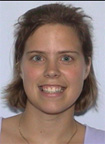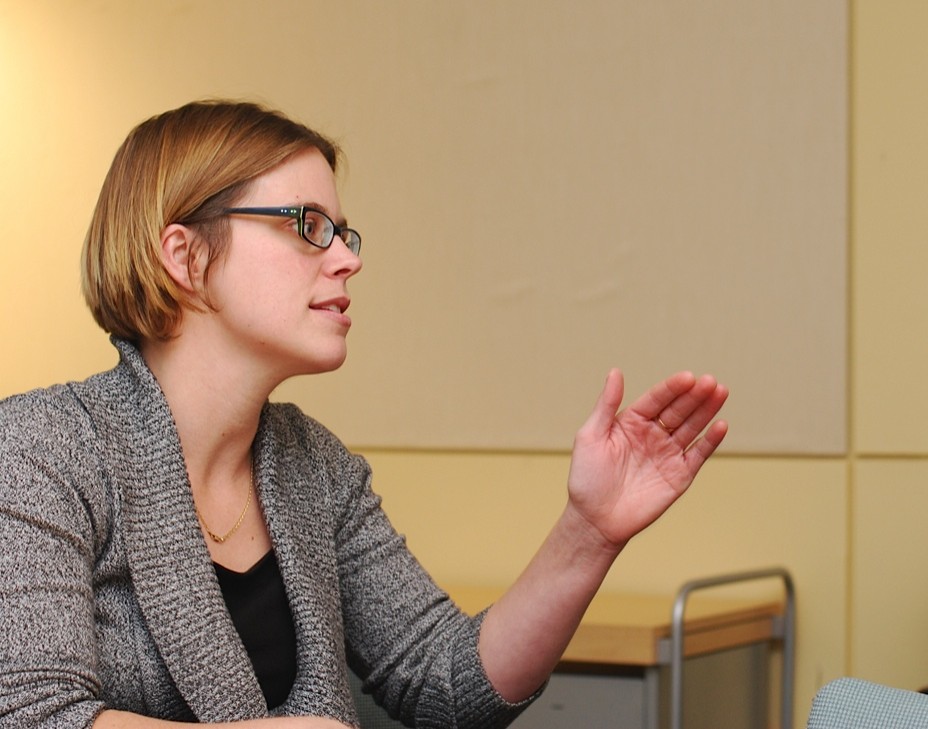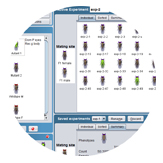 Professor Melissa Kosinski-Collins
Professor Melissa Kosinski-Collins
Title: Responding to the age-old question “Why do I have to take orgo?”
Group Meeting Date & Time: Wednesday, April 11, 2012 @ 2:00 pm
View the slides from Professor Kosinski-Collins’ Group Meeting
Professor Melissa Kosinski-Collins is an Associate Professor of Biology at Brandeis University. Professor Kosinski-Collins received her Ph.D. from MIT studying protein folding and aggregation in the laboratory of Jonathan King. Professor Kosinski-Collins completed a postdoc in Graham Walker’s HHMI Education Group contributing to the development of tools, such as StarBiochem, for teaching undergraduate biology courses and interactive exercises for Experimental Biology (MIT course 7.02) and Introductory Biology (MIT course 7.01). At Brandeis, Professor Kosinski-Collins has redesigned and taught a variety of courses including the introductory biology laboratory series, non-majors courses on protein folding diseases, graduate classes in protein structure and molecular biology and education courses on assessment and learning in science education.

Professor Kosinski-Collins discusses her introductory biology laboratory class during her group meeting presentation.
During her group meeting, titled “Responding to the age-old question: “Why do I have to take orgo?””, Professor Kosinski-Collins (Prof. KC) first discussed her work to inspire students and enhance their science education through project-based laboratory courses at Brandeis University. Prof. KC invested a lot of time in the redesign of the biology laboratory course. The redesigned biology laboratory course is now centered on two medically-related projects that simulate a real research project. In this project-based course, students are able to see what real research is like by posing novel research questions and interpreting previously-unknown results. Additionally, the projects have medical relevance. While the cell biology and biochemistry portion of the laboratory focuses on a protein implicated in cataract formation, the genetics and genomics portion of the laboratory course studies a signaling protein implicated in colon cancer.
Despite the redesign of the introductory biology laboratory course to be project-based and the obvious connections between organic chemistry and biology, the organic chemistry course at Brandeis remained a discrete, traditional-style laboratory course. Even though students were encouraged to take introductory biology and organic chemistry concurrently, most students were hesitant to do so. And, the students did not understand the importance of enrolling in the courses simultaneously as there were no connections developed between biology and chemistry.
Professor Kosinski-Collins, in collaboration with Chemistry Professor Jason Pontrello, set out to make inter-disciplinary biology & organic chemistry courses both focused on one unified project. As approximately 85% of students in the biology laboratory course intend to pursue a career in a health-related field, incorporating medical relevance was a high priority. The laboratory courses have now been redesigned around Huntington’s disease, a fatal neurodegenerative disorder caused by [CAG] repeats within the Huntingtin gene. The [CAG] repeats result in poly-Glutamine (poly-Q) polymers within the Huntingtin protein, which cause protein aggregates within the brain with devastating effects. Students are tasked with finding a cure for Huntington’s disease. They first synthesize polymer molecules to inhibit protein aggregation in the organic chemistry lab. Then, in the introductory biology lab course, students perform in vitro studies to determine the effect of the polymers on poly-Q peptides and in vivo studies to determine their effect on disease progression in a Huntington’s model in Drosophila.
The inter-disciplinary laboratory courses have been very productive: more than 30 polymer inhibitors have been synthesized in the 3 years of the new organic chemistry laboratory course and more than 27 different reaction series have been performed in in vitro experiments. Unfortunately, students have not produced positive results during the in vivo portion of the class as all of the flies were found dead. While the students were disappointed about their negative results, Prof. KC impresses upon the students that this is real science!

The interdisciplinary, project-based biology and organic chemistry laboratory courses focus on Huntington's disease
Professor Kosinski-Collins is currently performing a formal assessment of the inter-disciplinary biology and organic chemistry courses. While Prof. KC is waiting for the official results regarding increased student engagement and awareness in the newly redesigned courses, she has found that after three years of the newly redesigned introductory biology and organic chemistry laboratory courses, approximately 80% of students now take biology and organic chemistry simultaneously. The concurrent enrollment in biology and chemistry will hopefully greatly enhance student learning, engagement and awareness in both biology and organic chemistry as well as increase understanding about the importance of organic chemistry in biology. Hopefully the redesigned laboratory courses will put an end to the age-old question: “Why do I have to take orgo?”.
Professor Kosinski-Collins has now set her eye on creating truly inter-disciplinary biology, organic chemistry and physics laboratory courses all focused around one central project. Watch out physics!
Professor Kosinski-Collins has an extensive background in biology education-related outreach events and education. Professor Kosinski-Collins was the United States Academic Coordinator of the Biology Olympiad program for three years and is currently the editor-in-chief of the Atlas Journal of Science Education. Professor Kosinski-Collins received the Louis Dembitz Brandeis Prize for Excellence in Teaching in 2011 and is currently the MRSEC Director of Education and Outreach.



